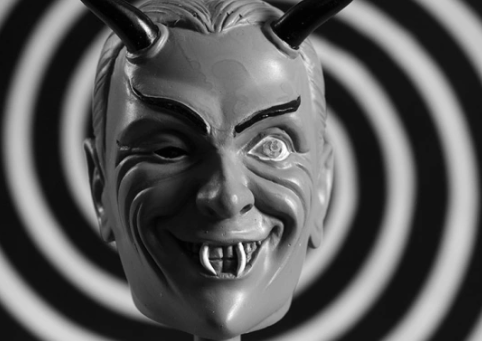How The Twilight Zone Helped Me With My Anxiety

I listened to a great podcast on The Art Of Manliness a few weeks ago about life lessons to be gleaned from the classic show, The Twilight Zone.
The conversation was between Brett McKay of AOM and a gentleman named Mark Dawidziak who wrote a book called “Everything I Need To Know I Learned In The Twilight Zone“.
Now, anyone who knows me know that The Twilight Zone is my all-time favorite television show. My mother introduced the series to my siblings and me, and come to think of it, I was a little too young to be watching it at the time. Nevertheless, every New Year’s Eve the The Twilight Zone marathon was on and we would sit and watch it for hours hoping to catch gems like “The Monsters Are Due On Maple Street” or “Eye Of The Beholder”.
The AOM podcast pointed out, rightly in my opinion, that when you’re young, The Twilight Zone is appealing because it’s creepy. Then, as you get older you’re more able to peel away the layers to really understand what the episodes are telling you. It is because of this that The Twilight Zone appeals to such a vast audience.
One of the things I disagreed with regarding the AOM podcast, however, is Mr. Dawidziak’s assertion that there are certain “rules” within The Twilight Zone, as in: people are punished or rewarded justly for their behaviors. He used the example of Burgess Meredith’s character in “Time Enough At Last” breaking his glasses at the end of the episode. That, according to Mr. Dawidziak violated the “rule” of The Twilight Zone because Meredith’s character didn’t do anything to deserve that fate. That is why that particular episode is not one of Mr. Dawidziak’s favorites.
I disagree that The Twilight Zone has any sort of set rule for whom it does or does not punish. One of the things I like about The Twilight Zone is that it, like life, doesn’t discriminate. You can be a great person and still get the short end of the stick. Meredith sums it up perfectly at the end of that episode when he laments, “That’s not fair! That’s not fair at all!”
And he’s right. It’s not fair. Life isn’t fair and neither is The Twilight Zone. Did Meredith’s character deserve that fate? Did the people of Peaksville, Ohio deserve to be tormented forever by little Anthony Fremont? Did Adam Grant deserve to suffer the same dream night after night in which he is fried in the electric chair?
The Twilight Zone doesn’t care. And because of that, it’s an accurate representation of life, in general. That’s part of the appeal.
One overlooked aspect of the brilliance of The Twilight Zone, I feel, is how quickly the “world” of each episode is built. All it takes is a few minutes of opening dialog and a short introduction by Rod Serling and you’re suddenly dropped in a dystopian future, or another planet, or in some other bizarre reality. Each episode quickly lays down the facts of the world you’re about to visit and then takes off like a shot to pack everything into a half-hour timeslot. It’s really a marvel of storytelling.
There is one episode in particular that I would like to discuss in this article and that episode is called “Nick Of Time”. This episode is a perfect example of one that I liked as a kid but truly learned to appreciate in adulthood. This is also an episode that has helped me deal with anxiety.
The plot of the episode revolves around a superstitious young man and his wife who are traveling across the country to New York City. Their car breaks down in a little town in Ohio and they pop into a diner to wait for the repairs to be made.

On the table in the diner is a little machine (the Mystic Seer) that, for a penny, will tell their fortune with all the specificity of a Magic 8-Ball.

The young man, Don, begins feeding pennies into the machine asking it questions about his career and their future, all of which seem to come true. When he asks the machine if he will get a promotion at work, the machine confirms he will, which prompts him to call his office. Lo and behold, he learns he has been promoted.

Given Don’s superstitious nature, the allure of the Mystic Seer is too much and he, against the protests of his wife, stays at the diner in fear of the Seer’s cryptic confirmation that something bad will happen to them if they leave before a certain time.
The hero of the episode is Don’s wife, Pat, who, after Don literally hugs the machine declaring its supernatural powers, convinces Don that, even if the machine CAN tell their future, he is his own man and can make his own decisions. She gently explains to him that he doesn’t have to live his life in fear.

This is a wake-up call for Don. He pulls himself away from the machine and confidently strides out of the diner. He and Pat get into their car and drive off together, eager to start their life.
But then something terrifying happens which is the real kicker of the episode!
As Don and Pat leave the diner, another couple enters. They are bedraggled and hurry over to the same Mystic Seer. They start feeding pennies into the machine asking if they will ever leave the town. The answer is not shown, but their expressions reveal that they are trapped until the Seer tells them they can leave.


What a genius move to show, not only Don overcoming his fear and living his life on his own terms, but also what happens when you let that fear rule your life. You become a prisoner of your own making.
How Don feels with the Mystic Seer is how I sometimes feel with anxiety. I feel like I am slave to behaving in certain ways. I’ll feel the need to continually check that I turned off the stove, or that I locked the door, or that I turned off the headlights. The problem, though, is that the more I indulge in these behaviors, the worse they get! That little itch isn’t satisfied the more I compulsively do this thing or that. Sometimes these actions cause me to run late or to not be able to get to bed on time. Or they just negatively affect my mood.
This reminds me of Don relentlessly feeding coins into the Seer hoping that he gets the answer that quells his anxiety. It’s not going to happen! Don needed the encouragement from his wife in order to break free.
Don’s defiant message to the Seer about living his own life sums up my relationship with my own anxiety. I feel like I sometimes need to look it square in the face and declare that it’s not going to run my life and that I won’t be a slave to it and have it decide what I do.
The real brilliance of this episode is that it’s never determined whether or not the Mystic Seer can actually see the future. As Pat points out to Don, the Seer only answers in generalities which Don then fills in for himself. Don creates the context around the Seer’s answers, not unlike how carnival psychics can “see the future”. That’s what’s so good about this episode: it really is Don’s anxiety that drives the entire plot and affects those around him. It’s such a good, and stark, example of what happens when we let fear run our lives.
This episode usually isn’t one that’s considered among the few episodes that doesn’t have any supernatural elements, like “Where Is Everybody?” or “The Shelter”, but it absolutely could be if you interpret it as I do. Again, so many layers!
Another thing I love about this episode (and how it helps me deal with anxiety) is that it shows how a strong relationship can help ground you and help you see things clearly. If Don were alone in the diner, there is a good chance he would have been engulfed by his fear and, just like the ragged couple at the end of the episode, never would have been able to pull himself away.
But he wasn’t alone! Pat was there and was able to guide him. She didn’t FORCE him away from the Seer, though. That’s crucial. She provided love and reassurance which was enough for Don to tap into HIS OWN courage and resolve in order to break free from the Seer. What a great example of how a loving relationship can amplify the best qualities of an individual and help that individual realize their potential.
When I’m feeling anxious, one of the best things for me to do is talk about it with my wife. Even if nothing gets “solved” just the fact of getting it off my chest and hearing her feedback is enough to turn down the temperature on whatever strange thoughts are boiling my brain.
There are so many awesome TZ episodes, but in my opinion “Nick Of Time” ranks as one of the very best.
My wife likes it too, but it’s mostly due to young William Shatner in a tight polo.



